INSIDE
RACING
T E C H N O L O G Y
IRT Home
IRT Home
News Page
Contents Page
Newsletter &
Books
email Paul
SPIR Test Page 2: Car Details
Bach to Sears Test Page 1
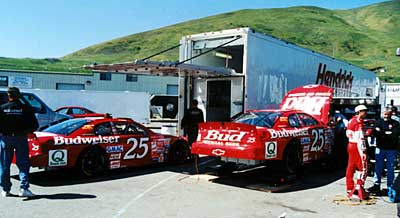
The Hendrick Motorsports cars for driver Wally Dallenbach. That's him standing at the right in the red driver's suit. Last year Jeff Gordon and Ray Evernham came to this test with a fifth-wheel trailer full of engines, rear ends, and diffs. They tested all kinds of combinations and then won the race from the pole. Look at the rich green of the hills. By the race in June they'll turn brown. There's only two seasons in Northern California, wet and dry.
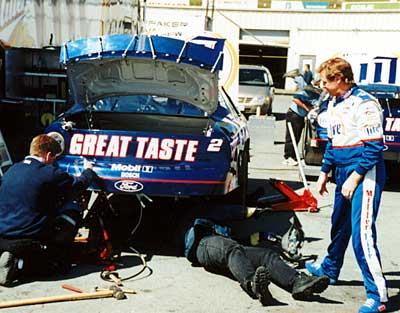
Rusty Wallace watches his crew repair some damage to the rear bodywork of his Ford Taurus caused when he lost control on cold tires and backed the car in to the tires at the top of the hill in Turn 2. Some licks with a big hammer and some racer tape got him going again.
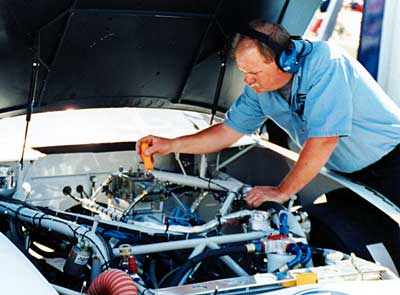
Rusty's engine guy tweaking the throttle stop at idle while the car was warming up.
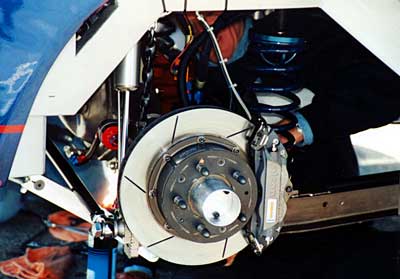
One of Rusty's crew is wiping down the suspension. This is the right-rear suspension. Those are Alcon brake calipers. The sway-bar link is at the left of the rotor. Right above that link is the axle end of the Panhard rod that locates the rear axle laterally. The flange where this end of the rod bolts to the axle is serrated to allow adjustment without movement when it's bolted up. A Penske shock is visible above the brake rotor. Notice the trailing arm going off to the right. This one is a simple I-beam. Some teams fabricate their trailing arms by welding a dozen or more laser-cut and stamped steel parts. Of course, low weight and stiffness are the goals.
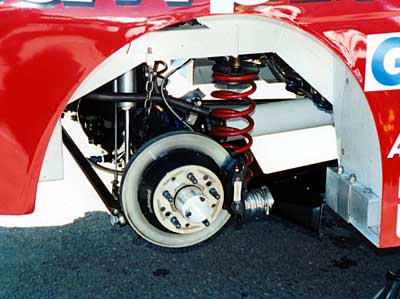
This is the right-rear suspension on one of Wally's Chevys. There's a scoop on the Wilwood caliper. The sway bar is a round rod above the brake rotor. This sway bar has a sliding mount for adjustment unlike the sway bar on the Ford above.You can see the Panhard rod mounted similar to the one on the Ford. Running beside the shock rod is a linear transducer so they can record suspension position during testing. That looks like a ballast weight bolted to the front of the wheel well. If it's ballast it's probably tungsten which is about 60% more dense than lead.
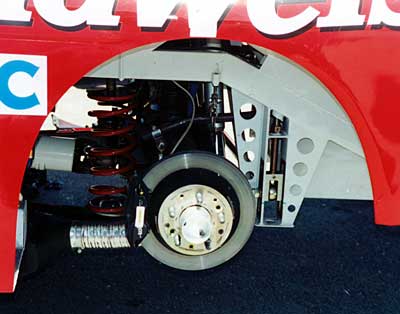
The left-rear corner of the same car. This end of the Panhard rod has an screw on the mounting allowing adjustment during pit stops. Notice the drilled-out gussets and braces that keep the rod from moving. All the lateral tire forces at this end of the car go through the Panhard rod to the chassis. I visited Hendrick Motorsports last September. They have a shop that builds all the chassis for the 25, 5, and 24 cars. They fabricate all their own bodies also. The three individual teams add their own tweaks to the cars.
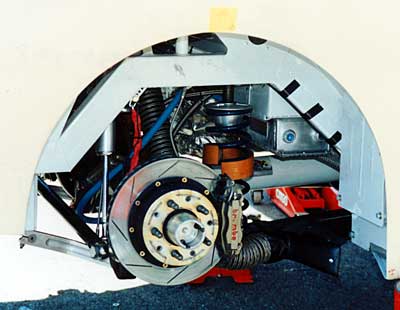
Another car has a spring rubber in place. This gives them a quick way to lower the spring rate without changing springs, saving time. They just pull the rubber out of the spring. These are Brembo brakes. The rotors have grooves machined into them like Rusty's Ford but unlike the 25-car. Most people think Winston Cup cars are all alike but you can see that's not true. Notice the differences in the frame in the two photos above. The Hendrick cars are very highly engineered.
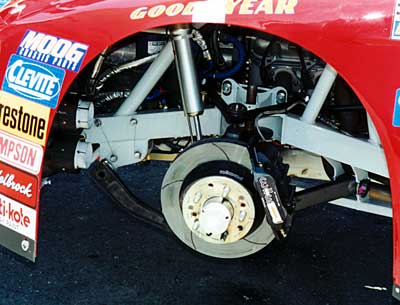
Finally, here's the front suspension on the 25-car. The brakes are Wilwood and the rotors are grooved. That's a Penske shock with a position sensor attached. You can see the upper A-arm and ball joint. Right behind that is the jacking screw for the coil spring. To the left at the front of the wheel well are two ducts for flexible tubing that will direct cooling air to the brakes. Sears Point is a heavy-braking track.
Pretty interesting iron, eh?